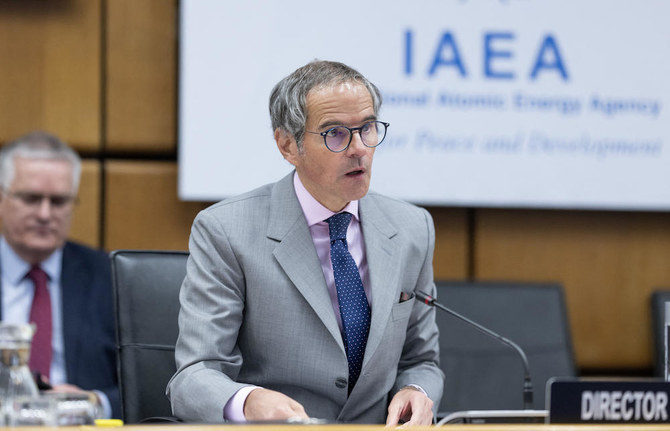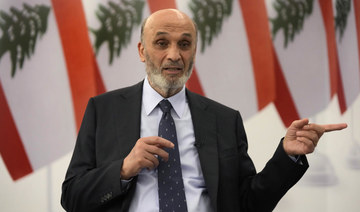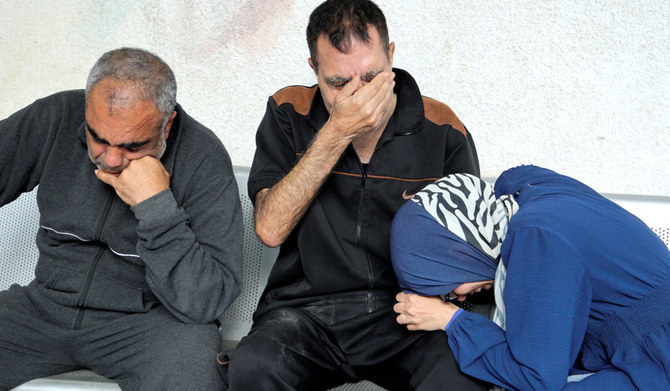JERUSALEM: Palestinian groups and supporters have welcomed an announcement by ice cream maker Ben and Jerry’s that it will stop selling its products in the occupied Palestinian territories.
The brand announced its decision on Monday, saying: “We believe it is inconsistent with our values for Ben and Jerry’s ice cream to be sold in the Occupied Palestinian Territory (OPT). We also hear and recognize the concerns shared with us by our fans and trusted partners.” It said that sales in Israel will continue.
The headline on the story about the announcement that ran in the Israeli newspaper Haaretz read: “Ben & Jerry’s freezes sales in settlements.”
The Palestinian Foreign Ministry described the decision as “moral” and “legal,” according to a report by Wafa, the official Palestinian news agency.
Israeli Foreign Minister Yair Lapid condemned the decision. In a message posted on Twitter, he wrote: “Ben and Jerry’s decision represents shameful surrender to antisemitism, to BDS (the Boycott, Divestment, Sanctions movement) and to all that is wrong with the anti-Israel and anti-Jewish discourse. We will not be silent.”
Jeremy Ben-Ami, the president of J Street, a lobbying group in Washington involved in Israel-Palestine issues, rejected the accusation of antisemitism.
“When a major ice cream company originally founded by two Jewish entrepreneurs decides not to sell its products in the occupied territories, that isn’t antisemitism,” he said.
Ali Abunimah, the co-founder of The Electronic Intifada, a Chicago-based online publication that covers the Israeli-Palestinian conflict, also responded to Lapid’s comment, writing: “Ice cream is anti-Semitic. Not content with murdering dozens of children in Gaza in May, this odious, criminal apartheid regime is now declaring war on @benandjerrys. Will @yairlapid order the bombing of its headquarters like ‘Israel’ bombed the AP?”
Abunimah was referring to the Israeli airstrike in May that destroyed a building that housed the offices of the Associated Press in the Gaza Strip.
Lapid also condemned the BDS movement, which promotes boycotts, divestments and economic sanctions against Israel, although there was no clear direct connection between it and the decision by the ice cream company.
He wrote on Twitter that more than 30 US states “have passed anti-BDS legislation in recent years. I plan on asking each of them to enforce these laws against Ben and Jerry’s. They will not treat the state of Israel like this without a response."
BDS welcomed the decision by the Vermont-based company, which is owned by British multinational consumer goods company Unilever, and said it was the result of years of efforts by activists.
“Following years of #BDS campaigns @benandjerrys has announced it will end sales of its ice cream in Israel’s illegal settlements on stolen Palestinian land,” the movement wrote on Twitter.
Politician Ayman Odeh, the head of the Arab Joint List in the Israeli Knesset, posted a photo of himself eating Ben and Jerry’s ice cream in Israel.
His colleague in the Knesset, Aida Touma-Sliman, wrote: “This decision is just and moral. The Occupied Palestinian Territories are not a part of Israel — and stopping sales in them will help put pressure for the end of the occupation. Hopefully B&J are not the last to take this step.”
While the situation in the occupied territories that sparked the decision and the political storm it provoked is undoubtedly serious, some online commentators saw the lighter side and an opportunity for humor.
Naila Farouki, a former producer of educational children’s show “Sesame Street,” wrote: “The Israeli government’s meltdown over #BenAndJerrys ice cream is such a light, fun summer vibe and I intend to revel in it while I enjoy a locally produced Mega dark chocolate. #BDS."
Mohammed El-Kurd, a social media influencer from Sheikh Jarrah in East Jerusalem also could not resist the use of a pun.
“Very pleased watching their politicians and henchmen meltdown over ice cream,” he wrote.
The decision by Ben and Jerry’s follows the cancellation of a friendly soccer match between Barcelona and Beitar Jerusalem. It came after the Spanish side said it would not play the match in occupied Jerusalem.
Palestinians say that Beitar’s hard-core fans have a history of racist chants, calling for the death of Arabs, and the team is the only major Israeli soccer club never to have signed an Arab player.























